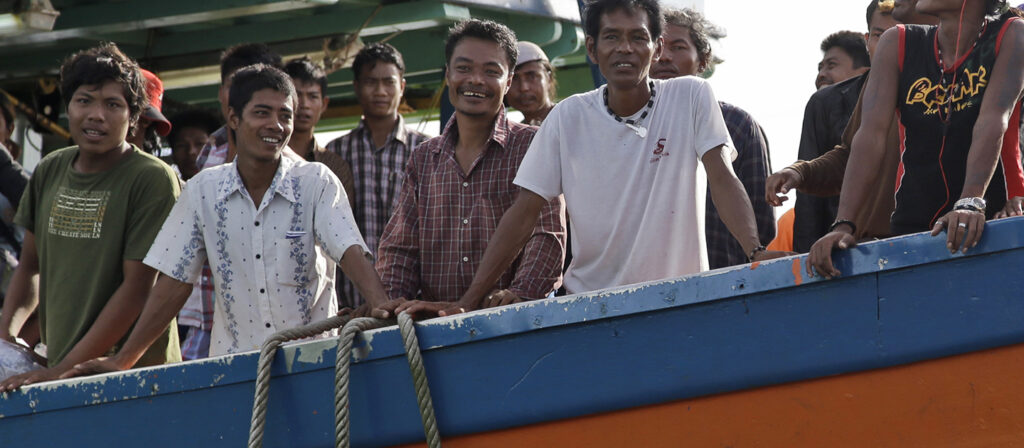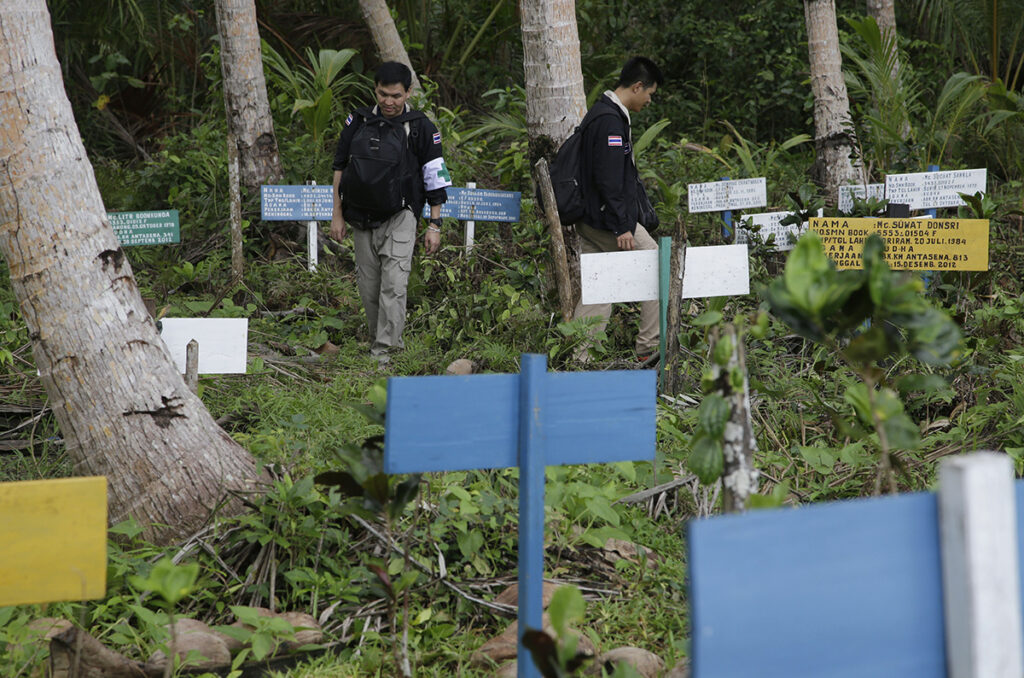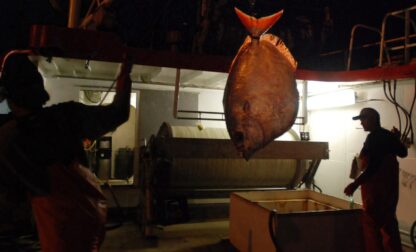
Authorities in Papua New Guinea have rescued eight fishermen held on board a Thai-owned refrigerated cargo ship, and dozens of other boats are still being sought in response to an Associated Press report that included satellite photos and locations of slave vessels at sea.
Two Burmese and six Cambodian men have been removed from the Blissful Reefer, a massive quarter-acre transport ship now impounded in Daru, Papua New Guinea, about 120 miles (200 kilometers) north of Australia. Officials said the fishermen appeared to be part of a larger group of forced laborers being transported from Thailand to be distributed onto various fishing boats, said George Gigauri, head of the International Organization for Migration in Port Moresby, which has assisted with the operation. He added that nearly 20 other crewmembers from the Blissful Reefer have not yet been questioned, and that if victims of trafficking are found, “there are lives at risk.”
The men are part of a seemingly inexhaustible supply of poor migrants from Myanmar, Cambodia and Laos who are forced to fish for the Thai seafood industry. When workers run away, become sick or even die, they are easily replaced by new recruits who are tricked or coerced by false promises of jobs in Thailand.
The story of Aung San Win, 19, who was among the rescued men, started the same way as with hundreds of other enslaved fishermen interviewed in person or in writing by AP during a year-long investigation into slavery at sea. He said a broker came to his home in Myanmar and convinced him and several other young men to go to Thailand where they could find good work in factories. But when they arrived, their passports and identification cards were taken. They were then pushed onto boats and told they would have to fish for three years and owed nearly $600 for their documents, he said.
The men are part of a seemingly inexhaustible supply of poor migrants from Myanmar, Cambodia and Laos who are forced to fish for the Thai seafood industry.
“They told us that we have to get off in this place and work here,” said Aung, who added that it had taken about 20 days to reach Papua New Guinea, after stops in Singapore and Australia. “I don’t want to work here. I don’t even know what this place is.”
Enslaved fishermen are routinely hauled from Thailand to work on smaller Thai trawlers in foreign waters where they are given little or no pay. Hundreds of former slaves told AP they were beaten or witnessed other crew members being attacked. They were routinely denied medicine, forced to work 22-hour shifts with no days off and given inadequate food and impure water.

The ship seized in Papua New Guinea, the Blissful Reefer, appears to be connected to a trafficking ring exposed by the AP that was sending seafood caught by slaves around the Indonesian island of Benjina to the United States. The Blissful Reefer is listed by Indonesian authorities as one of nine massive seafood transporters chartered by the fishing company in Benjina. And documents from the men on board showed they were brought to work on two trawlers, Chainavee 12 and Chainavee 24, from the same family of vessels AP found in Benjina.
The AP investigation revealed fishermen being held in a cage, buried under fake names in a company graveyard and trapped for years with no way to return home. Journalists followed their slave-caught fish back to Thailand and linked it to the supply chains of major U.S. food sellers, such as Wal-Mart, Sysco and Kroger, and American pet food companies, including Fancy Feast, Meow Mix and Iams. The businesses have all said they strongly condemn labor abuse and vowed to take steps to prevent it.
The report prompted rescues and repatriation of more than 800 men, and seven people have been charged with human trafficking.
In the past four months, AP has been tracking down another 34 boats, with as many as 20 men aboard each, that fled the slave island well before authorities and investigators arrived. First-hand accounts, satellite photos and public records located at least some of the vessels in a narrow, dangerous strait in western Papua New Guinea.
Authorities there then searched the fishing grounds, called the dogleg, with aircraft and stopped the Blissful Reefer. The prime minister’s office in Papua New Guinea and the National Fisheries Authority did not respond to requests for comment.
Indonesia Fisheries Minister Susi Pudjiastuti, whose investigators had been chasing the boats from Benjina, said she has asked Papua New Guinea to send back any illegal trawlers that fled her country for prosecution.
In the past four months, AP has been tracking down another 34 boats, with as many as 20 men aboard each, that fled the slave island well before authorities and investigators arrived.
International Organization for Migration spokesman Leonard Doyle told a United Nations briefing in Geneva that AP had alerted authorities last week about suspect boats and searchers had found “a group of mariners from one of these vessels to be victims of trafficking.” But time is ticking to find the others. All foreign boats must leave the Papua New Guinea strait by Friday, when a fishing moratorium will be put in place to clamp down on poaching, according to the National Fisheries Authority.
A patrol boat is expected to be sent to search waters in the strait along with a surveillance plane, Gigauri said. The eight men aboard the Blissful Reefer will be returned home.
Esther Htusan contributed to this report from Yangon, Myanmar.




